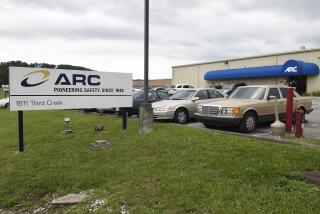A Muddle That Didn’t Have to Be
- Share via
Joan Claybrook, the former federal administrator who advocated air safety bags for cars and pushed through a rule requiring them, must be going through a wrenching experience. In the face of the deaths of 66 people from air bag deployments, regulators are pulling back from the commitment to the device and the public is losing confidence in it.
Surely Claybrook had the best of intentions when, as the new head of the National Highway Traffic Safety Administration in 1977, she insisted on the air bag requirement. Claybrook was, after all, acting as an advocate for an American public that was suffering injuries and deaths in cars designed with little thought for safety.
Conversely, the auto makers, seeing themselves as a vital industry employing thousands and making a product used by millions, felt that the economic stakes were so high in the car safety battle that they put a “tail” on Ralph Nader in an attempt to discredit the crusader.
Of course, toughness and intrigue are no strangers in the hurly-burly of Washington decision-making. A cacophony of viewpoints and emotions is always present, and our open system allows for battles of expression and wills. May the most articulate, the most popular or the most powerful win.
Yet is this the real meaning to draw from the air bag fatalities? Do these deaths simply represent an imperfect process, a give and take in which sometimes the outcome is unfortunate? We might instead look on these victims collectively as an invitation to seek a better way, a less adversarial approach while respecting, maybe even enhancing, the democratic spirit.
Some examples indicate that another way is possible. One has been in the news recently--the Marshall Plan, the massive undertaking that helped rebuild Europe in a remarkably cooperative manner after World War II. On a smaller scale, current examples include compromises in the continuing debate over protecting endangered species, with agreements that are saving wildlife while allowing some land development to go forward; dialogue groups where opponents in the always controversial abortion issue are sitting down together; and consensus-based community transformations in the midst of timber harvesting battles in the Pacific Northwest.
Indeed, policies and decisions can be made in a bipartisan spirit and without fights that can inflict wounds deeper than any victory can heal. In such circumstances, “advocacy” usually connotes something quite different from the claws out, no-holds-barred struggles that so often seem to mark the process of public policy in Washington today. Here are four ways to avoid a repeat of the air bag imbroglio:
* The opposition need not be demonized. Greed in the name of profit does indeed exist in our capitalist society. Zealotry in the service of public causes exists as well. But rigid attitudes of hatred and distrust between opposing parties reduce the chances of communication and compromise and dehumanize everyone involved. A safer air bag, minimizing accidental deaths and injuries, might have been designed and produced by now had there been less vitriol and misunderstanding between regulators and the auto industry.
* “Winning” takes on different properties. In the struggle over installing air bags, consumer advocates “won,” but their victory 20 years ago is turning into a disaster involving not only lost lives but great public confusion and difficult industry choices. More trust between advocates and auto makers might have produced a less troubled outcome.
* Truth is as important as trust, perhaps a prerequisite for it. Sometimes it appears as if the news media, public interest groups, businesses, lawmakers and administrations are engaged in one huge legal trial in which arguments by the various sides are presented, but somehow the core truth is never revealed. But if basic facts are put on the table, polarization may soften and reasonable solutions can be negotiated.
The entire auto safety debate over the years might have been a lot less angry and distrustful if the industry had not attempted to cover up the role that automobile design was playing in accidents.
* The most effective advocacy can include a strong element of listening. Specialists working with groups focusing on hot issues ask group members to tune in to the other person’s feelings, backgrounds and interests. It is ironic that in their eagerness to see air bags installed, safety advocates and federal regulators reportedly did not take seriously warnings from the manufacturers that the air bags could be perilous to children.
The air bag saga offers an important lesson: There are no angels in the Washington policymaking process. No matter how important the goal seems, the drive to prevail can be excessive, poor decisions can be made and mistaken policies can be issued. One could ask that the feisty, brawling interests in Washington--public and private, congressional and administrative--take a stab at being less zealous and single-minded. The public weal, which everyone professes to represent, would be better served.
More to Read
Get the L.A. Times Politics newsletter
Deeply reported insights into legislation, politics and policy from Sacramento, Washington and beyond. In your inbox three times per week.
You may occasionally receive promotional content from the Los Angeles Times.










